Don't wanna be here? Send us removal request.
Text
"That is why the fundamental problem of political philosophy is still precisely the one that Spinoza saw so clearly, and that Wilhelm Reich rediscovered: "Why do men fight for their servitude as stubbornly as though it were their salvation?" How can people possibly reach the point of shouting: "More taxes! Less bread!"? As Reich remarks, the astonishing thing is not that some people steal or that others occasionally go out on strike, but rather that all those who are starving do not steal as a regular practice, and all those who are exploited are not continually out on strike: after centuries of exploitation, why do people still tolerate being humiliated and enslaved, to such a point, indeed, that they actually want humiliation and slavery not only for others but for themselves? Reich is at his profoundest as a thinker when he refuses to accept ignorance or illusion on the part of the masses as an explanation of fascism, and demands an explanation that will take their desires into account, an explanation formulated in terms of desire: no, the masses were not innocent dupes; at a certain point, under a certain set of conditions, they wanted fascism, and it is this perversion of the desire of the masses that needs to be accounted for."
Gilles Deleuze and Felix Guattari, Anti Oedipus: Capitalism and Schizophrenia (Page 29)
776 notes
·
View notes
Photo
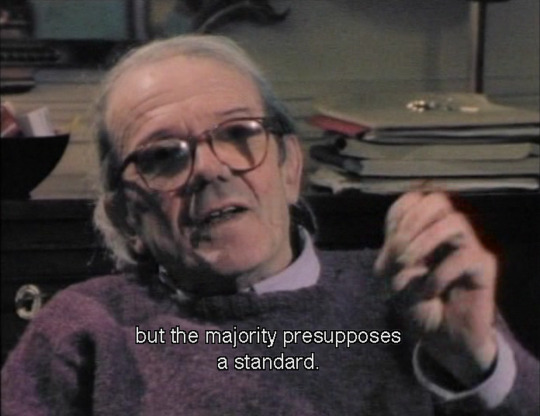


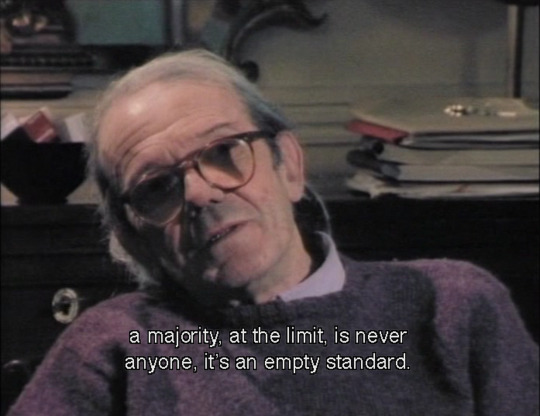
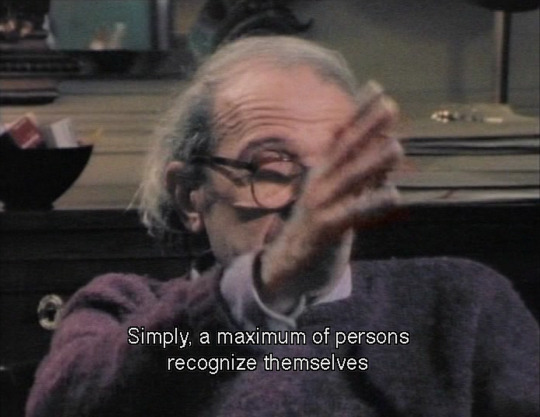

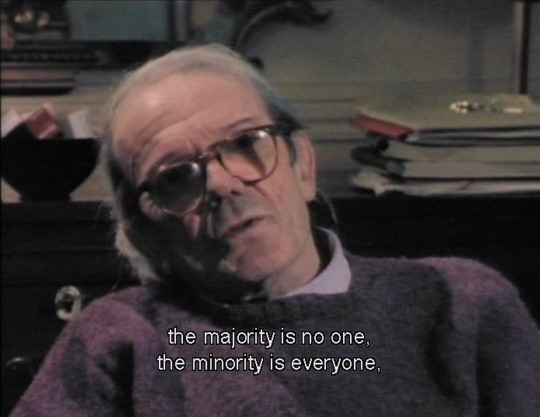
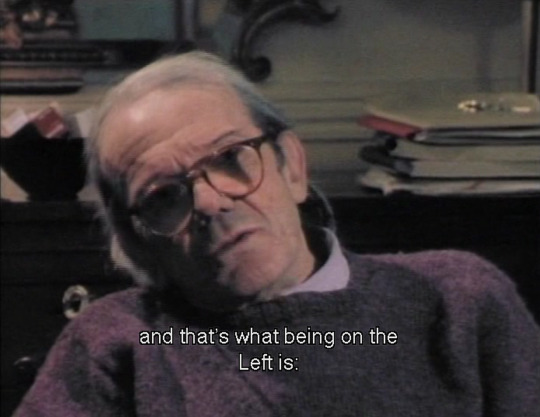

“and that’s what being on the Left is: knowing that the minority is everyone.”
“G as in Gauche (Left)”
Gilles Deleuze: From A to Z with Claire Parnet Semiotext(e) and MIT Press
2K notes
·
View notes
Text
There are, you see, two ways of reading a book, each grounded in a different image of thought. In the first, the book is treated as a vessel of representation—an object containing a signified essence, to be deciphered and interpreted in accordance with a logic of recognition. This is the reading of mediation, where concepts are extracted, one after another, as if each were a determination subordinated to the generality of meaning. The book becomes a nesting doll of other books, each enfolded within or enclosing the last. Annotation, commentary, exegesis—all fall under this regime, governed by the law of the Same and the model of resemblance. This is reading as infinite deferral within the dogmatic image of thought. But there is another way, an intensive reading that operates transversally, machinically. Here, the book is no longer a container but an intensive multiplicity, a divergent series, a system of singularities in flux. One no longer asks what does it mean? but how does it function?—how does it connect, what circuits does it form, what thresholds does it cross? The book works or it doesn’t, like an experiment that either produces a singular event or fails to effect any difference. In this mode, reading is no longer representational but productive, diagrammatic. It ceases to be a hermeneutic act and becomes an act of involution, of folding and unfolding between heterogeneous series. This is reading as encounter, as becoming: where the book is torn from itself and forced into conjunction with other machines—bodily, political, material, affective. And in this tearing, this love of proximity and experimentation, reading becomes an ethics of immanence: not interpretation, but participation.
Gilles Deleuze: Letter to a Harsh Critic (Difference and Repetition Edition)
314 notes
·
View notes
Text
"It's like a hole in my life, an eight-year hole. That's what I find interesting in people's lives, the holes, the gaps, sometimes dramatic, but sometimes not dramatic at all. There are catalepsies, or a kind of sleepwalking through a number of years, in most lives. Maybe it's in these holes that movement takes place."
—Gilles Deleuze, On Philosophy
4K notes
·
View notes
Text
“Images also have an inside or certain images have an inside and are experienced from inside. They’re subjects. And there’s a gap between actions upon these images and the reactions they produce. It’s this gap that enables them to store up other images, that is to perceive. But what they store is only what interests them in other images: perceiving is subtracting from an image what doesn’t interest us, there’s always less in our perception. We’re so full of images we no longer see those outside us for what they are.”
—
Gilles Deleuze, “Three Questions on Six Times Two” in Negotiations 1972-1990. This is basically Bergson 101.
(via mattersofconcern)
44 notes
·
View notes
Text
“Becoming is an antimemory.”
— Deleuze and Guattari, A Thousand Plateaus: Capitalism and Schizophrenia (via mothwood)
3K notes
·
View notes
Text
“My wound existed before me…”
— Gilles Deleuze, Pure Immanence: Essays on A Life (via mothwood)
4K notes
·
View notes
Text
“Write, form a rhizome, increase your territory by deterritorialization, extend the line of flight to the point where it becomes an abstract machine covering the entire plane of consistency.”
— Deleuze & Guattari
59 notes
·
View notes
Photo
pacogonzalez:
Summary of the Characteristics of The Society of Control. On Control Societies: A Deleuzian Postscript. Jia-Lu Cheng.
/via:ajnabee:

100 notes
·
View notes
Text
“It is a mistake to think that the painter works on a white surface. The figurative belief follows from this mistake. If the painter were before a white surface, he – or she – could reproduce on it an external object functioning as a model. But such is not the case. The painter has many things in his head, or around him, or in his studio. Now everything he has in his head or around him is already in the canvas, more or less virtually, more or less actually, before he begins his work. They are all present in the canvas as so many images, actual or virtual, so that the painter does not have to cover a blank surface, but rather would have to empty it out, clear it, clean it. He does not paint in order to reproduce on the canvas an object functioning as model; he paints on images that are already there, in order to produce a canvas whose functioning will reverse the relations between model and copy. In short, what we have to define are all these “givens” [données] that are on the canvas before the painter’s work begins, and determine, among these givens, which are an obstacle, which are a help, or even the effects of a preparatory work.”
— Gilles Deleuze. Francis Bacon The logic of sensation
43 notes
·
View notes
Photo


“Her and Lost In Translation are connected to each other. They’re very much on the same wavelength. They explore a lot of the same ideas. This all makes sense since Spike Jonze and Sofia Coppola were married from 1999 to 2003 and had been together for many years before that. Sofia Coppola had already made her big personal statement in regards to love and marriage right when the couple was on the verge of divorce; Her would be Spike Jonze’s answer to those feelings. What makes it even more poignant is that Her never feels resentful or petty. It feels more like a legitimate apology. It’s an acknowledgement that, in the end, some people aren’t meant to be with each other in the long run. Some people do grow apart. Lost in Translation is about a couple on the verge of growing apart, Her is about finally letting go of the person you’ve grown apart with and moving on.”
42K notes
·
View notes
Text
“It is by speed and slowness that one slips in among things, that one connects with something else. One never commences; one never has a tabula rasa; one slips in, enters in the middle; one takes up or lays down rhythms.”
— Deleuze, Spinoza: Practical Philosophy, 123
788 notes
·
View notes
Text
Ownership. Your: computer, significant other, the space you occupy, body, thoughts, words, television, food, backpack, seat on the bus as you sit in it, dignity, books, coffee, bicycle, death, projects, job, friends, parents, dog or cat, god, shoes, pants, t-shirt, attention, intentions, ethics, orgasm, vomit, art, fuck up, responsibility, glasses, degree, debt, cum, sweat, hearing, sight, indulgence, iPhone, Facebook page, email, window, bed, life, car, way, habits, tattoos, fingernails, hair, wants, needs, ego, superego, creativity, money, walk to work, contradictions, complications, children, bully, philosophy paper, brilliant idea, medicine, psychosis, hallucinations, depression, anxiety, joy, sex appeal, sobriety, good sense, vacation, view, journal, favorite dress, favorite position, movie, song, album, bar, place to hang out, erogenous zones, present, dissertation, alterity, propensity, political affiliation, pleasure, flight home, food stamps, paycheck, plans, promises, piercings, period, blood, spleen, asshole, testicles, clit, feet, teeth, brain, synapses, sensations, morality, feces, breakfast, conversation, beauty, eyes, fingers, regrets, losses, trauma, stigma, diagnosis, tent, addiction, phone bill, profile picture, last hook up, secret santa, favorite time of year, forgetfulness, appeals to authority, power, potency, autonomy, race, individuality, permeability, fear, anxiety, catatonia, schizophrenia, Truth, worldview, favorite philosopher, dinner, new favorite television show, new computer, dick picture, aptitude, self, alienation, subjectivity, gaze, sexual orientation, gender, sex, favorite dildo, favorite lube, favorite late night talk show host, dreams, mysteries, tremors, identity, spit, smell, erection, home, apartment, pronoun, celery, pizza, hangover, bad trip, good trip, skin, pores, blackheads, sexuality, style, past, unconscious, psychoanalyst, life-coach, therapist, client, subject, rules, enemy, enemies, enema, phenomena, benzodiazepines, president, pope, boss, movement, energy, preoccupation, ambition, character, writing, winter hat, coat, pubic hair, affliction, illness, voice, camera, uniform, persona, pen pal, self-love, meditative practice, spirituality, theories, shower, lipstick, existential crisis, candy, cognitive bias, reflexivity, watch, time alone, breath, mantras, stinky feet, embarrassment, masculinity, femininity, reservations, resume, skills, laugh, tax benefits, family eye doctor, song, teddy bear, wedding, cigarettes, emptiness, bra, suspenders, handwriting, plant, habits, blackheads, nationality, things.
68 notes
·
View notes

